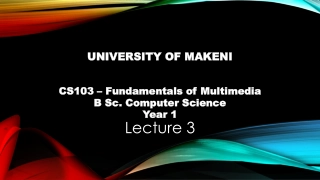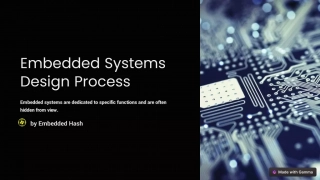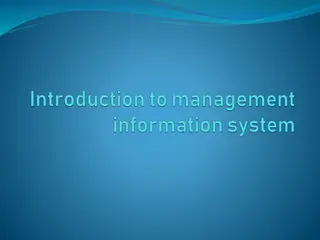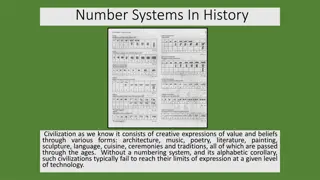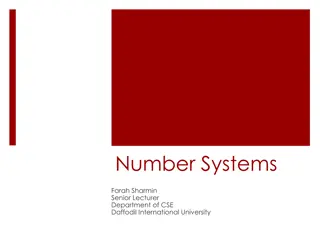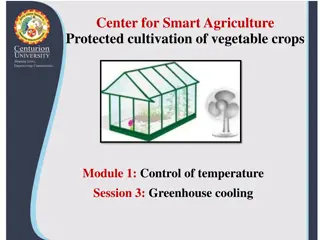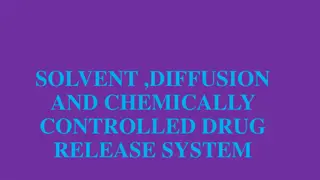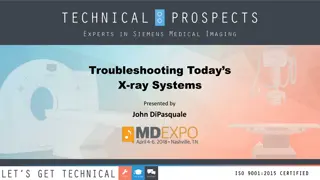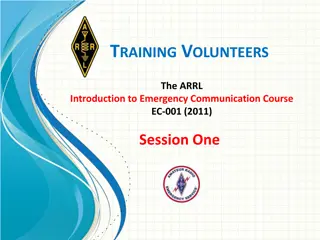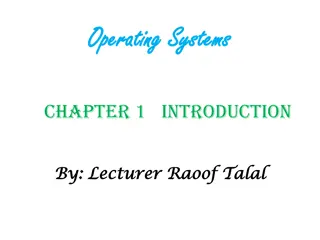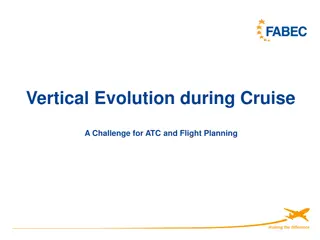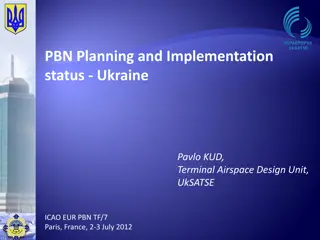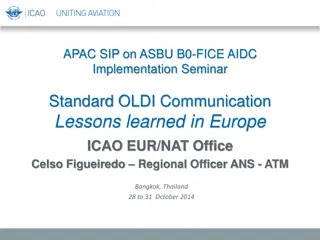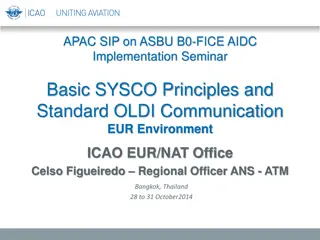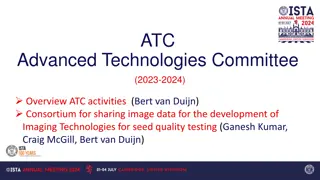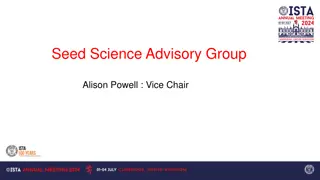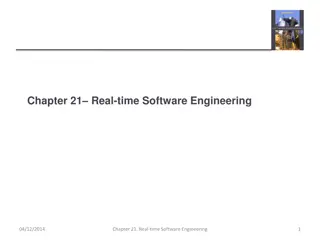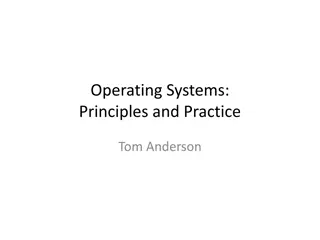Enhancing Food Systems for Improved Food Security and Job Creation
The importance of improving food systems to achieve sustainable development goals and enhance food security and job creation. It covers topics such as the current food systems, the impact of these systems, jobs in the food systems value chain, and key recommendations.
8 views • 24 slides
Understanding Multimedia Systems: Hardware and Software Components
Multimedia systems require specific hardware and software components to meet the demands of producing and playing multimedia content. Development systems are used for creating content with higher specifications, while playback systems are used for playing multimedia files with lower specifications.
9 views • 46 slides
Embedded Systems Design Process in the Embedded systems
Embedded systems are all around us, from the tiny microcontrollers in our household appliances to the sophisticated control systems in cars and aeroplanes. But how are these systems designed? Let's delve into the basics of the embedded systems design process in simple terms that anyone can understan
2 views • 9 slides
Overview of Distributed Systems: Characteristics, Classification, Computation, Communication, and Fault Models
Characterizing Distributed Systems: Multiple autonomous computers with CPUs, memory, storage, and I/O paths, interconnected geographically, shared state, global invariants. Classifying Distributed Systems: Based on synchrony, communication medium, fault models like crash and Byzantine failures. Comp
10 views • 126 slides
Operating Systems
An operating system is a crucial program that manages all other programs on a computer. It handles tasks like input recognition, file management, and device control. There are different types of operating systems such as single-user, single-task systems, multi-user, multi-task systems, real-time ope
6 views • 11 slides
Understanding Information Systems in Organizational Management
Management in organizations is divided into three levels: operational, tactical, and strategic. Each level requires different information systems to support various activities. Operational systems focus on routine transactions and control processes, while middle-level systems aid in semi-structured
10 views • 39 slides
Understanding Negative Results in Systems Research
Systems research encompasses various areas such as operating systems, networking, and distributed systems. Negative results in systems research often go unpublished, leading researchers to focus on curating positive outcomes. This practice can hinder the credibility of scientific findings and impede
5 views • 23 slides
Explore the Top 5 Trends in Alarm Systems with Shellharbour Security Systems
Explore the latest trends in alarm systems with Shellharbour Security Systems. Learn about advancements such as smart home integration, wireless technology, AI-powered monitoring, and more. Stay informed to enhance your home or business security with cutting-edge solutions. Visit: \/\/shellharbourse
7 views • 8 slides
Understanding Management Information Systems (MIS)
Management Information Systems (MIS) are vital for collecting, processing, and analyzing data in business activities. They assist decision makers, facilitate communication, and maintain records. Components include people, data, business procedures, hardware, and software. Various types of informatio
3 views • 11 slides
Number Systems In History
Civilizations throughout history have expressed their values and beliefs through various creative forms like architecture, music, and literature. The development of numbering systems played a crucial role in advancing society's ability to communicate, track records, and engage in trade. From the ear
1 views • 17 slides
Introduction to Database Management System Explained
This presentation covers the basics of database management systems, including definitions of data, types of data, structured and unstructured data, storing data in computers using file systems and database systems, and issues with file systems like data redundancy, inconsistency, difficult data acce
2 views • 18 slides
Understanding Different Types of Recommender Systems
Recommender systems play a crucial role in providing personalized recommendations to users. This article delves into various types of recommender systems including Collaborative Filtering, Content-Based, Knowledge-Based, and Group Recommender Systems. Collaborative Filtering involves making predicti
1 views • 7 slides
Understanding Number Systems and Their Characteristics
Dive into the world of number systems, exploring non-positional and positional systems. Learn about the unique features of each system, including the use of symbols and digits, as well as how to convert numbers between different bases. Discover the Decimal Number System and its significance in every
2 views • 33 slides
Efficient Greenhouse Cooling Systems for Smart Agriculture
Active summer cooling systems like fan-and-pad and fog systems are crucial for maintaining optimal temperatures in greenhouses. These systems work by utilizing evaporation to remove heat from the air. Fan-and-pad cooling systems have been in use since 1954, where water is passed through pads to cool
1 views • 23 slides
National Mine Safety Week 2023 - Vehicle Safety Guidelines
Explore the comprehensive safety guidelines for vehicle operation during National Mine Safety Week 2023. Learn about maintaining safety equipment, cabin safety systems, visibility safety systems, operational safety systems, emergency safety systems, other safety systems, training responsibilities, a
1 views • 10 slides
Understanding Enterprise Resource Planning (ERP) Systems
Enterprise Resource Planning (ERP) systems are comprehensive business management systems designed to coordinate resources, information, and activities within an organization. From integrated systems to non-integrated ones, ERP offers various advantages such as customization, increased data security,
1 views • 17 slides
Polymeric Controlled Drug Delivery Systems
Polymeric controlled drug delivery systems play a crucial role in regulating drug release through diffusion, solvent penetration, and chemical mechanisms. These systems include diffusion-controlled, solvent-controlled, and chemically-controlled devices, each operating based on specific principles. S
1 views • 33 slides
Troubleshooting Today's X-ray Systems by John DiPasquale
Gain insights into troubleshooting modern X-ray systems with a comprehensive guide presented by John DiPasquale. Explore X-ray system subsystems, including generator systems and imaging systems, with detailed explanations and visuals. Learn about the basics of generator systems, required circuits, a
1 views • 33 slides
Smart Antenna Systems Overview: Enhancing Wireless Performance
Smart antenna systems, like adaptive array antennas and switched beam antennas, combine antenna arrays with digital signal processing to transmit and receive signals adaptively. These systems improve signal quality, reduce interference, and increase capacity by dynamically adjusting radiation patter
0 views • 20 slides
Understanding Emergency Communication Systems for Volunteer Training
This content covers various topics related to emergency communication systems for volunteer training, including agency communication systems, government radio systems for police and fire departments, emergency medical radio systems, American Red Cross frequencies, and types of served-agency radio sy
2 views • 29 slides
Introduction to Embedded Systems Design
Embedded Systems Design, Chapter 1 provides an insightful overview of embedded systems, distinguishing them from general-purpose computers. The chapter delves into the characteristics of embedded systems, their design considerations, and the various types of embedded computers such as general-purpos
2 views • 7 slides
Understanding Computer System Architectures
Computer systems can be categorized into single-processor and multiprocessor systems. Single-processor systems have one main CPU but may also contain special-purpose processors. Multiprocessor systems have multiple processors that share resources, offering advantages like increased throughput, econo
2 views • 25 slides
Understanding Foreign Exchange Rate Systems and Their Impact on Economies
Foreign exchange plays a crucial role in the global economy, representing all currencies other than a country's domestic currency. Different exchange rate systems like fixed, flexible, and managed floating rates have distinct features and implications for trade, capital flows, and macroeconomic stab
2 views • 49 slides
ATC Center Uniform Policy and Hygiene Standards
This policy outlines the uniform requirements for staff members at ATC Center, emphasizing cleanliness, professionalism, and maintaining a safe environment for children in their care. It also highlights the importance of personal hygiene practices and the necessity of wearing identification badges.
0 views • 11 slides
Success Stories of Dayton Independent Schools Students
Dayton Independent Schools is dedicated to inspiring, engaging, and nurturing growth in its students. Learn about the remarkable academic and career achievements of students like Joseph McGuire in CIT courses, Devin Schloemer pursuing HVAC certification, Nelleh Buschle taking college courses at NKU,
0 views • 12 slides
Proposed Changes in Capacity Reports for Implicit Auctions
A proposal for new reporting requirements related to offered capacity in implicit auctions, focusing on identifying interconnector trading opportunities in specific trading periods. The report aims to provide crucial data such as minimum IUN allocation, import/export offered capacity, ATC values, an
0 views • 12 slides
Evolution of Vertical Flight Planning Challenges in Aviation
In the past, flight plans were static, but now they are dynamic and automated, leading to more level changes during cruise. This evolution poses challenges for air traffic control and flight planning, as shown in practical examples of flight route deviations. The shift signifies the need for enhance
0 views • 16 slides
Information Systems in Organizations: Overview and Implementation
Information systems play a crucial role in organizations, encompassing transaction processing systems, functional area information systems, and enterprise resource planning systems. This content delves into the purpose of transaction processing systems, the support provided by information systems ac
2 views • 30 slides
PBN Planning and Implementation Status in Ukraine
The PBN Planning and Implementation status in Ukraine involves initiatives such as the implementation of Precision Area Navigation (P-RNAV) and Approach Procedures with Vertical Guidance (APV). Ukraine is working on national RNAV1 implementation for standard instrument procedures at various aerodrom
1 views • 17 slides
Implementing System Supported Coordination (SYSCO) for ATC Communication: Lessons from Europe
Explore the background and challenges of implementing Online Data Interchange (OLDI) in Europe, focusing on the SYSCO standard coordination and terminology. Discover how flights are safely transferred between ATC units and the evolution of OLDI messages since the early 1980s. Gain insights into the
0 views • 22 slides
Understanding OLDI in Air Traffic Control Systems
Air Traffic Control systems use the OLDI process to ensure safe transfer of flights between different ATC units. OLDI involves the coordination and transfer phases, where controllers exchange data to maintain air traffic safety. The use of standardized messages and online data interchange has improv
0 views • 39 slides
Understanding Cascade Control Systems in Industrial Processes
Cascade control systems play a crucial role in improving process control efficiency by incorporating feedback loops within feedback loops. This type of control architecture helps to better handle disturbances and variations in the process by creating secondary loops that monitor specific parameters.
2 views • 8 slides
Sustainable Education for Human and Environmental Systems
Sustainable Education for Human and Environmental Systems (SHES) focuses on fostering sustainable societies through social learning and systems thinking. It aims to promote interconnectedness between human and environmental systems, with a vision of enhancing well-being while maintaining the viabili
0 views • 19 slides
ATC Advanced Technologies Committee Overview 2023-2024 Activities
The ATC Advanced Technologies Committee, led by Bert van Duijn, focuses on sharing image data for developing imaging technologies for seed quality testing. With members from 13 countries, the committee engages in various working groups exploring X-ray, molecular, and mathematical technologies. They
0 views • 10 slides
Global TBO Symposium 2024: Advancing Aviation Technologies
Explore the future of aviation at the Global TBO Symposium 2024 through discussions on enabling technologies, air-ground collaboration, data link for ATC/ATM functions, aircraft operational updates, and safety-critical decision-making processes. Dive into topics like trajectory sharing, dynamic capa
0 views • 4 slides
Understanding Embedded Systems and Cyber-Physical Systems
Embedded systems are specialized computer systems embedded within larger systems, such as control systems and car controllers. This lecture covers real-time aspects, applications of Cyber-Physical Systems (CPS), and examples like the Boeing 777/Airbus A380 cockpit. It discusses the design process of
1 views • 22 slides
Seed Science Advisory Group Overview
Detailed information about the Seed Science Advisory Group (SSAG) including its members, functions, terms of reference, evaluations, and proposed adjustments to address overlaps with the Advanced Technology Committee (ATC). The SSAG plays a crucial role in linking fundamental research with practical
0 views • 7 slides
Understanding Real-time Software Engineering for Embedded Systems
Embedded systems play a crucial role in controlling various machines and processes. Real-time software engineering focuses on designing systems that respond instantly to events, ensuring correctness and timeliness. Characteristics like continuous operation, unpredictable environment interactions, an
0 views • 59 slides
Understanding Operating Systems: Principles and Practice in CSE Curriculum
Dive into the world of operating systems through the lens of "Operating Systems: Principles and Practice" by Tom Anderson. Discover how this course fits in the UW CSE curriculum, covering systems programming, operating system interfaces, and distributed systems. Explore the project work on building
0 views • 21 slides
CWE Flow-Based Intraday Developments - Current Status and Future Outlook
CWE has been working on implementing Flow-Based Intraday Capacity Calculation (FB.IDCC) initiatives since 2014, focusing on improving ID ATC processes and methodologies. Despite challenges with CGMES standards implementation causing delays, CWE TSOs and NRAs have agreed to temporarily halt FB.IDCC a
0 views • 4 slides

